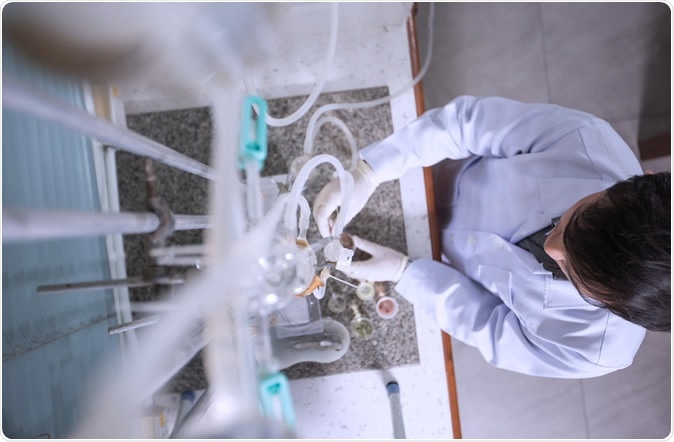PiCoVacc vaccine candidate for COVID-19 effective in animal trials - News-Medical.Net
In a new study available on the bioRxiv preprint server, a group of researchers from China report on the pilot-scale production of a purified inactivated severe acute respiratory syndrome coronavirus 2 (SARS-CoV-2) virus vaccine candidate (PiCoVacc), shown to induce virus-specific neutralizing antibodies in rats, mice, and non-human primates.

The coronavirus disease (COVID-19) caused by SARS-CoV-2 caused an unprecedented crisis, taking a heavy toll not only on human health but also on the global economy. The number of COVID-19 cases is still on the rise worldwide, without a proven treatment modality or vaccine.
"The serious pandemic of the current COVID-19 and the precipitously increasing numbers of death worldwide necessitate the urgent development of a SARS-CoV-2 vaccine, requiring a new pandemic paradigm", explains the bioRxiv study researchers.
This expert group is affiliated with Sinovac Biotech Ltd, Peking Union Medical College, Chinese Academy of Sciences, Zhejiang Provincial Center for Disease Control and Prevention in Hangzhou, National Institute for Communicable Disease Control and Prevention, Academy of Military Medical Sciences and National Institute for Food and Drug Control in Beijing, China.
Purified inactivated virus as a vaccine option
Purified inactivated viruses have been traditionally utilized in vaccine development, providing safe and effective vaccines to prevent diseases caused by viruses, such as poliovirus and influenza virus. The pertinent question is whether the same concept can be applied for SARS-CoV-2.
In order to develop preclinical laboratory neutralization assay and unveil their candidate for the SARS-CoV-2 vaccine, the researchers initially identified optimal clinical SARS-CoV-2 strains between eleven isolates from the bronchoalveolar lavage fluid samples of hospitalized patients.
Propagation of selected strain in a 50-liter culture of Vero cells (using cell factory and inactivated with beta-propiolactone) has been used to produce a pilot-scale PiCoVacc for animal studies. Initial immunogenicity screening was performed in Wistar rats and BALB/c mice within biosafety level 3 facilities.
This was followed by exploring the immune response in rhesus macaques, a non-human primate species that develops COVID-19-like disease after SARS-CoV-2 exposure. And the results were encouraging: the vaccine candidate potently neutralized ten representative SARS-CoV-2 strains, indicating a broader neutralizing ability against the strains circulating in the population.
Promising efficacy data
"Immunization with two different doses (3 or 6 micrograms per dose) provided partial or complete protection in macaques against SARS-CoV-2 challenge, respectively, without any antibody-dependent enhancement of infection", study authors report their findings.
Albeit T-cell responses elicited by many vaccines are often crucial for acute viral clearance, protection from subsequent coronavirus infections is mostly mediated by humoral immunity. Actually, the 'cytokine storm' that can be induced by excessive T-cell response may actually worsen the prognosis of COVID-19 patients; thus, any T-cell response elicited by the SARS-CoV-2 vaccine has to be adequately controlled.
Accordingly, their vaccine candidate PiCoVacc induced the presence of efficacious neutralizing antibodies. This was shown not only in macaques but also in mice and rats – without an antibody-dependent enhancement phenomenon that sometimes occurs when antibodies actually enhance viral entry into host cells and subsequent viral replication.
Favorable safety profile
Systematic evaluation of PiCoVacc by monitoring clinical signs, biochemical, and hematological indices, as well as histopathology of various organs (including lungs, heart, liver, and brain) in macaques, suggests that the vaccine is safe. Although the best animal model for COVID-19 is still not established, rhesus macaques are the best surrogate model to date.
"We provide extensive evidence for the safety of PiCoVacc in macaques; neither infection enhancement nor immunopathological exacerbation was observed in our studies", report the study authors. "Our data also demonstrate complete protection against SARS-CoV-2 challenge with a 6 μg per dose of PiCoVacc in macaques", they conclude.
Taking everything into account, the results suggest a path towards the clinical development of SARS-CoV-2 vaccines for use in humans. Phase I-III clinical trials with PiCoVacc, but also with other SARS-CoV-2 vaccine candidates, are expected to commence later this year.
Important Notice
bioRxiv publishes preliminary scientific reports that are not peer-reviewed and, therefore, not be regarded as conclusive, guide clinical practice/health-related behavior, or treated as established information.
Gao, Q. (2020). Rapid development of an inactivated vaccine for SARS-CoV-2. bioRxiv preprint server. https://doi.org/10.1101/2020.04.17.046375

Comments
Post a Comment